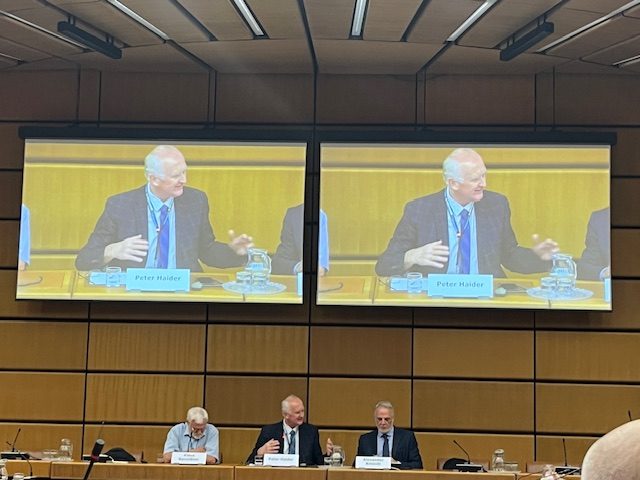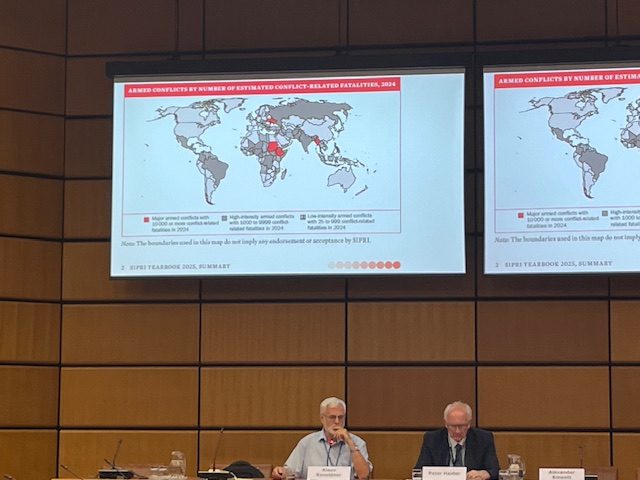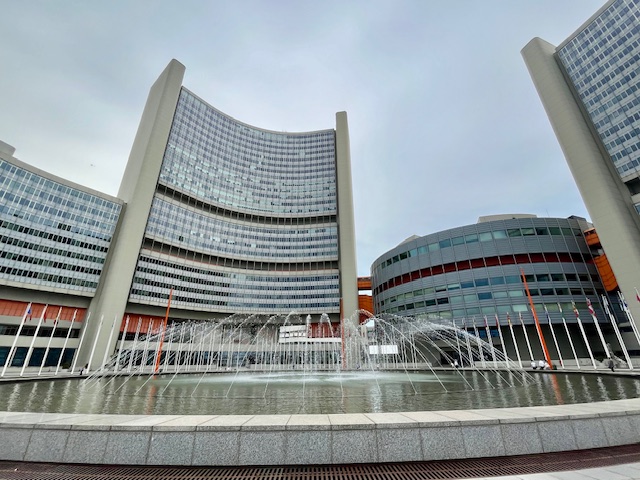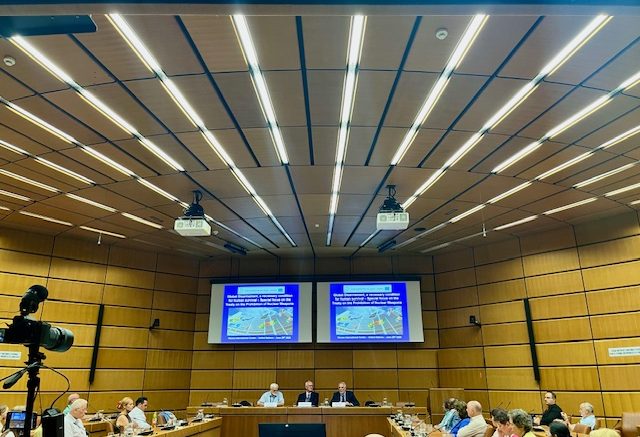
On June 26th, 2025, “NGO COMMITTEE ON PEACE – VIENNA” organized an information and discussion meeting at Vienna International Center (VIC) on “Global Disarmament, a necessary condition for human survival – Special focus on the Treaty on the Prohibition of Nuclear Weapons”. Two speakers were invited to the meeting, including Dr. Klaus Renoldner, IPPNW – International Physicians for the Prevention of Nuclear War, Medical doctor and sustainability researcher, and Ambassador Alexander Kmentt, Director of the Disarmament, Arms Control and Non-Proliferation Department of the Austrian Foreign Ministry. Author of the book “The Treaty Prohibiting Nuclear Weapons: How it was Achieved and Why it Matters”.

Against the backdrop of today’s precarious regional wars and energy dilemma, the issue of prohibiting nuclear weapons should be a top priority on the global agenda. As chairman, Mr. Peter Haider from UPF gave a welcoming speech to all the attenders of the meeting before the PPT presentation by Dr. Klaus Renoldner from IPPNW.

Dr. Klaus Renoldner focused his presentation on nuclear weapons and the medical challenge of disarmament in light of a new arms race. He pointed out that nuclear disarmament is a repressed goal but necessary condition for global health. The presentation gave a historical picture of how destructive the nuclear bombs have been, citing the deadly event on August 6, 1945, when the US detonated a 15-kiloton bomb over Hiroshima in Japan. The immediate death tolls of tens of thousands were followed by secondary and long-term damages. Yet the global nuclear weapon inventories have been stocked up constantly. Amid armed conflicts and new wars today, number of estimated conflict-related facilities is shooting upward. As a matter of fact, a new arms race is being running. World military expenditure in 2024 has risen to 2718 billion US dollars (SIPRI Fact Sheet).
Global nuclear mapping, nuclear testing before 2000, planetary boundaries, and 2030 UN agenda on sustainable development goals were among the topics Dr. Renoldner touched. He also gave a medical summary of seven reasons for the prohibition of nuclear weapons, i.e., the destructive dimension (kilotons and megatons of equivalents to conventional), weapons of mass murder, nuclear famine and ecological destructions, creation of distrust and insecurity, wasted money and intelligence, increasing risk for explosion by error, and no means to fight terrorism.

As diplomat and expert on disarmament issues, Ambassador Alexander Kmentt expounded the situation of nuclear arm race from both quantitative and qualitative aspects. He turned the clock back to 1947 when Einstein was actively involved in discussions and public education regarding the implications of nuclear weapons. “Had I known that the Germans would not succeed in developing an atomic bomb, I would have done nothing,” Einstein told Newsweek magazine that year.
Mr. Kmentt addressed the influence of today’s geopolitics and the application of AI technology, mentioning the worrying regions where nuclear weapons are all present. Some governments have even signaled the readiness to use those weapons. “The problem about nuclear weapons is we are not allowed to see it before the action is taken,” he said.
Yet the debate about nuclear weapons today concentrates on if they are the ultimate guarantee for world security or destruction. Nuclear deterrence, as an important threat during the Cold War and beyond, is still being used as a principle today. UK said recently it is the ultimate security guarantee, creating the so-called nuclear umbrella for the non-nuclear allied states, too. Mr. Kmentt recalled the nuclear threat in the 1980s and said, it is now again a very actual question unfortunately. “People talk about food shortages and public health a lot, but they don’t have some much to talk about on nuclear weapons”, he noted, and even worse, “scientific consequences of nuclear weapons are still unclear.”

A change of paradigm is necessary to avoid tremendous medical/human consequences as well as political consequences, Mr. Kmentt stressed, quoting the Helsinki Accord and hoping for positive discussions by OSCE. More importantly, however, is to reinforce the “Treaty on the Prohibition of Nuclear Weapons” adopted on 7 July 2017 by the United Nations conference to negotiate a legally binding instrument to prohibit nuclear weapons, leading towards their total elimination. “The (recent) US attack on the nuclear facilities in Iran is against the international law,” he remarked.
Crowds of questions were raised by the audience from different regions with different perspectives. Worrying attitude toward the world peace, mixed with anxiety and confusion, was hanging in the air, to which Dr. Renoldner asked for optimism. “Out of total despair, Stefan Zweig committed suicide in 1942. He would have seen a different world in 3 years. Now the world is better. So, we should be positive,” he concluded with a smile.


Be the first to comment on "“Global Disarmament, a necessary condition for human survival – Special focus on the Treaty on the Prohibition of Nuclear Weapons”, an Information and Discussion Meeting Successfully Convened at Vienna International Center"